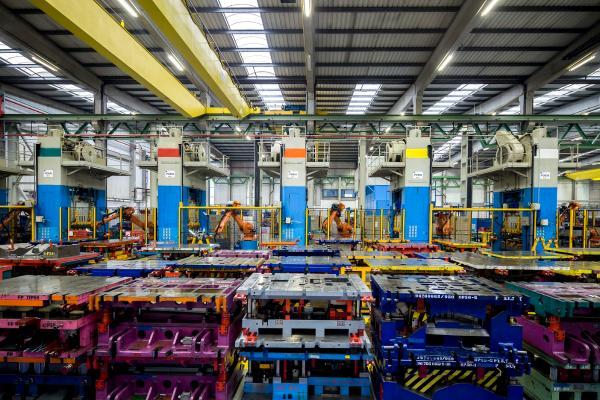Spain: Support for innovation in the European car industry – EIB finances Gestamp’s RDI strategy to the tune of EUR 200 million

- EU bank funds will contribute to the development of safer, lighter and more environmentally friendly vehicles
- Agreement supported by Investment Plan for Europe
The Spanish multinational Gestamp, which specialises in the development and manufacture of metal components for the automotive industry, is receiving a EUR 200 million loan from the European Investment Bank (EIB) to develop new research lines enabling the production of safer, lighter and therefore more environmentally friendly cars.
The agreement signed represents fresh support for RDI investment by the automotive industry in Europe, a sector which employs around 14 million people and is currently struggling to cope with the impact of the COVID-19 crisis.
Gestamp’s EIB-financed innovation strategy will centre on the development of new metal processing technologies for application to the production of vehicle components such as chassis and bodywork. The project aims to facilitate the design of lighter and safer vehicles. The new components will also boost the development of electric vehicles, helping to cut emissions.
The EIB funding will enable Gestamp to invest in innovation, research and development in its factories in Spain, Germany, France and Sweden. A large part of these investments will take place in Spain, where Gestamp has its headquarters.
The loan is backed by the Investment Plan for Europe, which enables the EIB to finance projects that present particular value added owing to their structure or nature. The project will be implemented over a period of four years and will help to safeguard highly skilled jobs. Gestamp currently has 43 000 employees, 1 600 of which work in the RDI area.
“Investing in innovation has to be one of the key components of fostering economic recovery in the wake of the coronavirus crisis. This is why we are pleased to be supporting an innovative project that will strengthen the competitiveness of a great Spanish multinational and contribute to European leadership in the automotive industry, one of the sectors hit by the impact of the pandemic,” said EIB Vice-President Emma Navarro, responsible for the Bank’s activities in Spain. “This agreement will boost the development of electric cars and lighter and less polluting vehicles. Financing clean technologies is one of the EIB’s priorities in facilitating the transition to a new low-carbon economic model,” Vice-President Navarro added.
Paolo Gentiloni, European Commissioner for the Economy, said: “With the financial support of the European Investment Bank in the InvestEU framework, Gestamp will invest in the development of safer, less polluting and more efficient vehicles: investment in a green future that we shall continue building together when we emerge from this crisis.”
“This EIB support is reinforcing Gestamp’s commitment to innovation, one of our Group’s priorities in its contribution to the production of lighter and safer vehicles. Innovation has always been essential to Gestamp’s activity, but it will undoubtedly gain even more importance as we emerge from the crisis that we are facing,” said Gestamp’s CEO, Francisco López Peña. “This EIB loan represents a show of confidence in Gestamp’s project, and it will strengthen the Group’s financing means so that it can continue contributing to the development of the mobility of the future,” he added.
Financing RDI and climate action
Innovation and skills development are essential ingredients in bringing about sustainable growth and the creation of highly skilled jobs. Both play a key role in achieving long-term competitiveness. This is why financing innovation is one of the EIB’s top priorities. In 2019, the EU bank provided EUR 14.44 billion to finance different RDI projects. In Spain alone, last year the EIB made available over EUR 1.32 billion in support of the innovation projects of Spanish companies.
The EIB is among the world’s largest multilateral providers of climate finance. Its goal is to be a leader in mobilising the finance needed to limit the average global temperature increase to 1.5°C compared to preindustrial levels in order to meet the Paris Agreement objectives. On 14 November 2019, the EIB Board of Directors approved its new climate objectives and the new energy lending policy. The Bank will gradually increase its financing for climate and environmental objectives up to 50% by 2025, with the goal of ensuring that the EIB Group mobilises at least EUR 1 trillion in the critical decade between 2021 and 2030 to promote investments helping to meet these objectives. It also announced its intention to align all EIB Group activities with the Paris Agreement. To this end, the EIB will cease financing fossil fuel-based projects from late 2021.
Gestamp is a multinational company specialising in the design, development and manufacture of highly engineered metal components for the main vehicle manufacturers. It develops innovatively designed products for use in the manufacturing of lighter and safer vehicles with better energy consumption and a lower environmental impact. Its products cover the bodywork, chassis and mechanism segments. The company operates in 23 countries, with 112 industrial plants, 13 R&D facilities and a workforce of some 43 000 employees around the world. Its total revenue in 2019 was EUR 9.065 billion. Gestamp is listed on the Spanish stock exchange under the GEST ticker.


